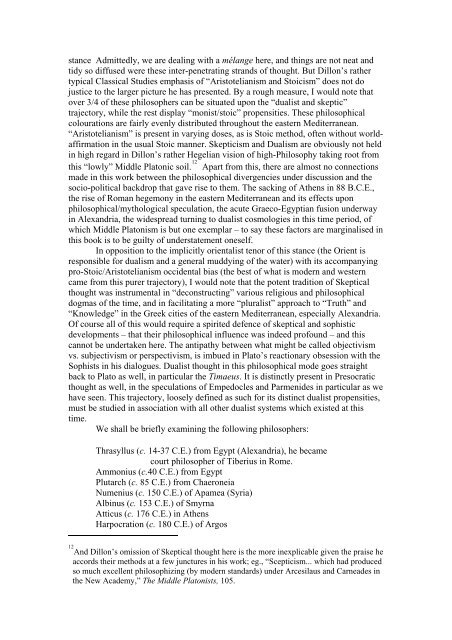THE EGYPTIAN FOUNDATIONS OF GNOSTIC THOUGHT
THE EGYPTIAN FOUNDATIONS OF GNOSTIC THOUGHT
THE EGYPTIAN FOUNDATIONS OF GNOSTIC THOUGHT
You also want an ePaper? Increase the reach of your titles
YUMPU automatically turns print PDFs into web optimized ePapers that Google loves.
stance Admittedly, we are dealing with a mélange here, and things are not neat and<br />
tidy so diffused were these inter-penetrating strands of thought. But Dillon’s rather<br />
typical Classical Studies emphasis of “Aristotelianism and Stoicism” does not do<br />
justice to the larger picture he has presented. By a rough measure, I would note that<br />
over 3/4 of these philosophers can be situated upon the “dualist and skeptic”<br />
trajectory, while the rest display “monist/stoic” propensities. These philosophical<br />
colourations are fairly evenly distributed throughout the eastern Mediterranean.<br />
“Aristotelianism” is present in varying doses, as is Stoic method, often without worldaffirmation<br />
in the usual Stoic manner. Skepticism and Dualism are obviously not held<br />
in high regard in Dillon’s rather Hegelian vision of high-Philosophy taking root from<br />
this “lowly” Middle Platonic soil. 12<br />
Apart from this, there are almost no connections<br />
made in this work between the philosophical divergencies under discussion and the<br />
socio-political backdrop that gave rise to them. The sacking of Athens in 88 B.C.E.,<br />
the rise of Roman hegemony in the eastern Mediterranean and its effects upon<br />
philosophical/mythological speculation, the acute Graeco-Egyptian fusion underway<br />
in Alexandria, the widespread turning to dualist cosmologies in this time period, of<br />
which Middle Platonism is but one exemplar – to say these factors are marginalised in<br />
this book is to be guilty of understatement oneself.<br />
In opposition to the implicitly orientalist tenor of this stance (the Orient is<br />
responsible for dualism and a general muddying of the water) with its accompanying<br />
pro-Stoic/Aristotelianism occidental bias (the best of what is modern and western<br />
came from this purer trajectory), I would note that the potent tradition of Skeptical<br />
thought was instrumental in “deconstructing” various religious and philosophical<br />
dogmas of the time, and in facilitating a more “pluralist” approach to “Truth” and<br />
“Knowledge” in the Greek cities of the eastern Mediterranean, especially Alexandria.<br />
Of course all of this would require a spirited defence of skeptical and sophistic<br />
developments – that their philosophical influence was indeed profound – and this<br />
cannot be undertaken here. The antipathy between what might be called objectivism<br />
vs. subjectivism or perspectivism, is imbued in Plato’s reactionary obsession with the<br />
Sophists in his dialogues. Dualist thought in this philosophical mode goes straight<br />
back to Plato as well, in particular the Timaeus. It is distinctly present in Presocratic<br />
thought as well, in the speculations of Empedocles and Parmenides in particular as we<br />
have seen. This trajectory, loosely defined as such for its distinct dualist propensities,<br />
must be studied in association with all other dualist systems which existed at this<br />
time.<br />
We shall be briefly examining the following philosophers:<br />
Thrasyllus (c. 14-37 C.E.) from Egypt (Alexandria), he became<br />
court philosopher of Tiberius in Rome.<br />
Ammonius (c.40 C.E.) from Egypt<br />
Plutarch (c. 85 C.E.) from Chaeroneia<br />
Numenius (c. 150 C.E.) of Apamea (Syria)<br />
Albinus (c. 153 C.E.) of Smyrna<br />
Atticus (c. 176 C.E.) in Athens<br />
Harpocration (c. 180 C.E.) of Argos<br />
12<br />
And Dillon’s omission of Skeptical thought here is the more inexplicable given the praise he<br />
accords their methods at a few junctures in his work; eg., “Scepticism... which had produced<br />
so much excellent philosophizing (by modern standards) under Arcesilaus and Carneades in<br />
the New Academy,” The Middle Platonists, 105.










